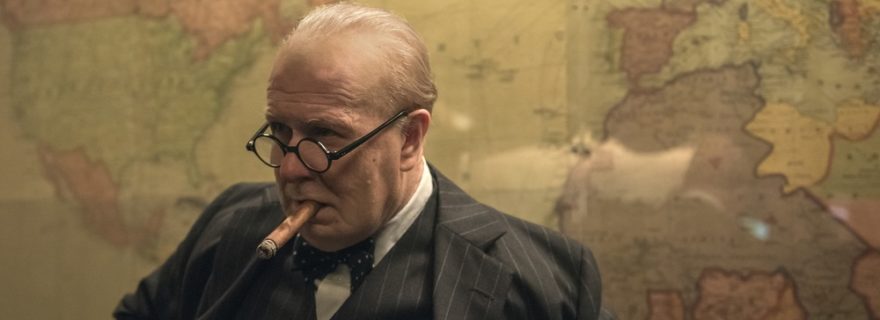'Darkest Hour'
Movie Rating:
3.5
‘Darkest Hour’ is one of those awards-baiting bio-pics that exist purely to get a long overlooked actor an Oscar. Casting the intense Gary Oldman as the lovably excessive Winston Churchill is a stunt designed to get attention. Often, this leads to a great performance and an almost unwatchable film that doesn’t deserve it. Thankfully, ‘Darkest Hour’ is a rare exception to that rule.
Make no mistake, this project is first and foremost a feature-length Oscar clip for Gary Oldman. Within those confines, director Joe Wright has also delivered a stirring and cinematic history lesson and bit of deserved hero worship that’s actually worth seeing. It also proves to be an odd and unexpected companion piece to Christopher Nolan’s ‘Dunkirk’, even if it’s unlikely the films will share much overlap in their audiences.
Thankfully, this isn’t some sort of birth-to-death “Great Man” tale. Instead, Wright narrows in on a single month of Winston Churchill’s life where he grew from an establishment eccentric into the beating heart of a nation. It picks up as the previous Prime Minister, Neville Chamberlain (Ronald Pickup), steps down from office while declaring that the only way to deal with Hitler’s ongoing march around Europe is to strike some sort of plea deal. Churchill (Gary Oldman, in case you weren’t paying attention) sees it a little differently. He clocks Hitler for the psychotic madman that he is and knows that the nation has no choice but to fight against him. The trouble is convincing the country. Finding a way to make the battle cry feel noble and the inevitable massive loss of life seem justified isn’t easy. Many stuffy suits will have to be dismissed. The odd old man must find the strength to lead the nation. Amusingly, there’s barely any focus on battle or violence. Instead, this is a war movie about the power of words and rhetoric focused on a man who wielded those two tools with a skill and purpose that few others have ever delivered.
Joe Wright is a filmmaker who typically works in grand sweeping visuals. His most famous shot is a single-take wonder in ‘Atonement’. He has a couple of opportunities to go big here, but the movie is largely set in dusty rooms with dusty men having dusty conversations. That doesn’t stop Wright from flexing his filmmaking muscles, though. His camera glides nimbly around scenes and frames actors dramatically. He works his buns off to make the material feel cinematic and kind of pulls it off. The movie has a visual drive and focus that shouldn’t be possible given the subject matter. Occasionally, it plays as overkill (especially when the director leans into red light for drama and gratuitous symbolism). For the most part, Wright’s overactive visual imagination elevates the material above what it could have been in lesser hands. It feels like a big movie, even when it shouldn’t. The visuals always isolate Churchill and emphasize the pressure he’s under. It’s subjective storytelling thrust onto a screenplay that could easily have been dryly observational.
The script has highs and lows. The depiction of Churchill is stirring. Everyone else feel like pawns in the film’s chess game. A series of nearly indistinguishable Brits in suits bicker and moan. A couple of women provide living embodiments of compassion in ways that are a bit icky, if historically appropriate. Big sentimental moments ring so false that they nearly derail the movie. (When Churchill steps onto a subway at a dramatic moment in the story, feel free to take a bathroom break.) The film is overly sentimentalized, histrionic, and manipulative. That can often feel a bit forced and maudlin, especially since the story is so familiar. However, as it plods along, something begins to click. It’s stirring stuff, no matter how familiar. While the final speech can be assumed before it even hits the screen, it still registers as a stirring climax. It also amusingly overlaps with last summer’s ‘Dunkirk’ in ways that make the movies odd companion pieces for those who care.
Gary Oldman disappears not just into the pudgy padding and prosthetics, but Churchill’s personality too. He’s a lovable crank and passionate humanitarian trapped into making some of the most difficult choices in the history of his country. Oldman plays Churchill not as a man destined to be a hero, but as a caring politician who gradually grows to accept the role. It’s inspiring and easy to forget who is playing the iconic historical figure because Oldman gives himself over to the role so thoroughly.
‘Darkest Hour’ is what happens when a truly gifted actor and filmmaker get their hands on mediocre material. This could have been just another forgettable WWII bio-pic. Instead, the movie has enough flashes of brilliance to make up for every time the it disappointingly slinks into routine. ‘Darkest Hour’ is no masterpiece, but Oldman’s performance is a work of brilliance and Joe Wright finds enough ways to make the chamber drama feel like riveting cinema even when it’s not.




NJScorpio
“We shall defend our island, whatever the cost may be, we shall fight on the beaches, we shall fight on the landing grounds, we shall fight in the fields and in the streets, we shall fight in the hills; we shall fight everyone.”
“What do you mean “everyone”?”
“EVERYONE!”
Phil
well done. i giggled.
AA
classic deep cut – LEON
Judas Cradle
Deep cut?!
That is about as deep a cut as “may the force be with you,”
Judas Cradle
-“especially since the story is so familiar.”
High Schools and Colleges don’t teach reL history anymore. I’m sure 99% of Milllennials have no idea about this story or Chuchill. They were probably taught that he was a white racist, and all the other Left wing fake history being spewed in academia.